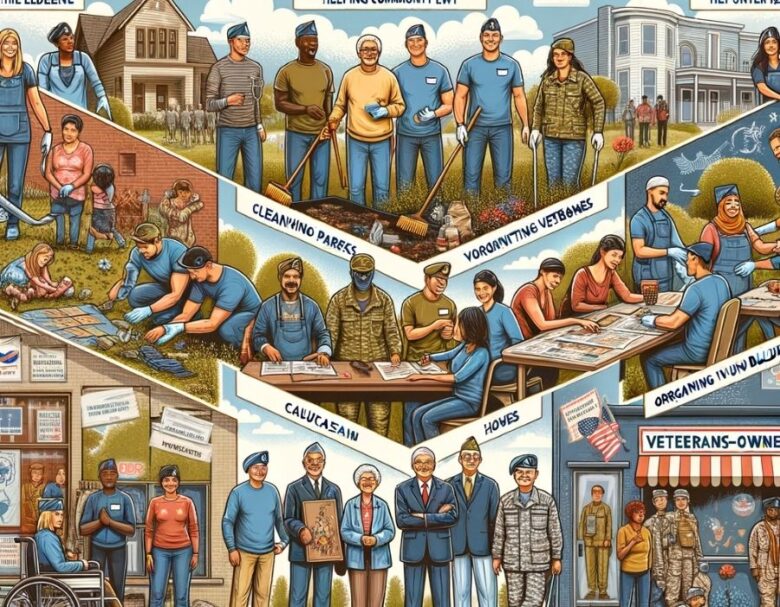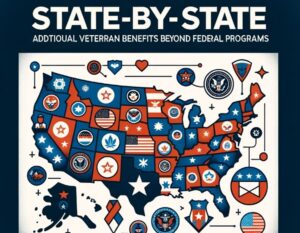The entrepreneurial spirit that drives many veterans to start their own businesses is a testament to the leadership, discipline, and problem-solving skills honed during military service. Supporting veteran-owned businesses not only helps fellow service members succeed in their post-military careers but also contributes to the overall strength of our communities and economy. This guide explores the landscape of veteran-owned businesses and how you can support them.
The Impact of Veteran-Owned Businesses
Veteran-owned businesses play a significant role in the U.S. economy and job market.
Key Statistics:
- Over 2.5 million businesses in the U.S. are majority-owned by veterans
- Veteran-owned businesses employ more than 5 million people
- These businesses generate over $1 trillion in annual revenue
- Veterans are 45% more likely to be self-employed than non-veterans
Supporting these businesses helps create jobs and drives economic growth.
Types of Veteran-Owned Businesses
Veteran entrepreneurs can be found in virtually every industry.
Common Industries for Veteran-Owned Businesses:
- Professional services (consulting, IT, etc.)
- Construction and contracting
- Retail and e-commerce
- Food service and hospitality
- Manufacturing
- Healthcare and wellness
The diversity of these businesses reflects the wide range of skills veterans bring to entrepreneurship.
Certifications for Veteran-Owned Businesses
Several certifications can help identify and support veteran-owned businesses.
Key Veteran Business Certifications:
| Certification | Issuing Body | Key Benefit |
|---|---|---|
| Veteran-Owned Small Business (VOSB) | VA | Federal contracting opportunities |
| Service-Disabled Veteran-Owned Small Business (SDVOSB) | VA | Enhanced federal contracting opportunities |
| National Veteran-Owned Business Association (NaVOBA) | NaVOBA | Corporate contracting opportunities |
| Veteran-Owned Business Enterprise (VBE) | Various states | State-level contracting opportunities |
These certifications can provide businesses with access to special programs and contracts.
How to Support Veteran-Owned Businesses
There are many ways to support veteran entrepreneurs in your community and beyond.
Ways to Support:
- Choose veteran-owned businesses for your purchases
- Spread the word about great veteran-owned businesses
- Leave positive reviews for their products or services
- Engage with their social media content
- Consider veteran-owned businesses for corporate contracts
Your support can make a significant difference in the success of these businesses.
Finding Veteran-Owned Businesses
Several resources can help you locate veteran-owned businesses to support.
Resources for Finding Veteran-Owned Businesses:
- National Veteran-Owned Business Association (NaVOBA) directory
- Veteran Owned Business Directory (veteranownedbusiness.com)
- StreetShares Foundation’s Veteran Business Directory
- Local chambers of commerce
- Social media platforms (look for #veteranowned hashtags)
These resources make it easy to find and support veteran entrepreneurs in your area.
Challenges Faced by Veteran Entrepreneurs
Understanding the challenges can help you provide more meaningful support.
Common Challenges for Veteran Business Owners:
- Access to capital and funding
- Transitioning military skills to civilian business contexts
- Building a professional network
- Navigating complex regulations and paperwork
- Balancing business demands with health concerns (especially for disabled veterans)
Awareness of these challenges can guide your support efforts.
Government Programs Supporting Veteran-Owned Businesses
Several government programs aim to support veteran entrepreneurs.
Key Government Support Programs:
- VA’s Vets First Verification Program
- Small Business Administration’s Office of Veterans Business Development
- Department of Defense’s Procurement Technical Assistance Centers
- State-level veteran business support programs
- Federal contracting set-asides for veteran-owned businesses
These programs provide resources, training, and contracting opportunities for veteran entrepreneurs.
Success Stories of Veteran-Owned Businesses
Highlighting success stories can inspire both veterans and consumers.
Examples of Successful Veteran-Owned Businesses:
- Black Rifle Coffee Company
- Sword & Plough
- Combat Flip Flops
- Grunt Style
- ScoutComms
These businesses demonstrate the potential for success in veteran entrepreneurship.
Mentorship and Networking for Veteran Entrepreneurs
Mentorship can be crucial for the success of veteran-owned businesses.
Mentorship and Networking Resources:
- SCORE’s Veteran Fast Launch Initiative
- American Corporate Partners (ACP) Mentoring Program
- Bunker Labs
- Veteran Business Outreach Centers (VBOCs)
- Local veteran business networking groups
These resources can provide valuable guidance and connections for veteran entrepreneurs.
Funding Resources for Veteran-Owned Businesses
Access to capital is crucial for business growth and success.
Funding Options for Veteran Entrepreneurs:
- VA Small and Veteran Business Programs
- SBA Veterans Advantage Guaranteed Loans
- StreetShares Foundation Veteran Small Business Awards
- Hivers and Strivers Angel Investment Group
- Veteran Crowdfunding Platforms (e.g., iFundWomen Military)
These resources can help veteran entrepreneurs secure the funding they need to start and grow their businesses.
Corporate Programs Supporting Veteran-Owned Businesses
Many corporations have initiatives to support veteran entrepreneurs.
Corporate Support Programs:
- Walmart’s Veteran-Owned Business Initiative
- Amazon’s Military Entrepreneurs Program
- USAA’s Supplier Diversity Program
- The Home Depot’s Operation Opportunity
- JPMorgan Chase’s Veteran-Owned Business Program
These programs often include mentorship, funding, and contracting opportunities.
Frequently Asked Questions
Q: How can I verify if a business is truly veteran-owned? A: Look for official certifications like VOSB or SDVOSB, or check directories from reputable organizations like NaVOBA.
Q: Are there tax benefits for supporting veteran-owned businesses? A: While there are generally no direct tax benefits for consumers, businesses may be eligible for tax incentives for contracting with veteran-owned companies in some states.
Q: Can non-veterans partner with veterans to start a veteran-owned business? A: Yes, but for official certifications, the veteran must own at least 51% of the company and be involved in day-to-day operations.
Q: How can I start my own veteran-owned business? A: Start by developing a business plan, securing funding, and registering your business. Then look into veteran-specific resources and certifications.
Q: Are there specific industries where veteran-owned businesses are more prevalent? A: While veteran-owned businesses exist in all industries, they are particularly common in defense contracting, construction, professional services, and retail.
Conclusion
Supporting veteran-owned businesses is more than just a way to thank veterans for their service; it’s an investment in the entrepreneurial spirit and economic strength of our communities. These businesses represent the continued service of veterans, as they create jobs, drive innovation, and contribute to local economies across the nation.
By choosing to support veteran-owned businesses, you’re not only getting quality products and services but also helping to empower those who have served our country as they embark on new missions in the business world. Your support can make a tangible difference in the success of these enterprises, whether it’s through your purchases, word-of-mouth recommendations, or by choosing veteran-owned businesses for corporate contracts.
Remember that the challenges faced by veteran entrepreneurs are unique. Many are transitioning from military service to the business world, navigating new terrain much as they did during their service. Your understanding and support during this transition can be invaluable.
For veterans considering entrepreneurship, know that there is a robust network of support available. From government programs and corporate initiatives to mentorship opportunities and funding resources, there are numerous avenues to help you succeed in your business venture. Don’t hesitate to tap into these resources and connect with fellow veteran entrepreneurs who have walked this path before you.
To consumers and businesses looking to support veteran entrepreneurs, seek out veteran-owned businesses in your community and beyond. Look for certifications, use directories, and ask around. Your choice to support these businesses can have a ripple effect, creating opportunities and inspiring more veterans to pursue their entrepreneurial dreams.
Ultimately, supporting veteran-owned businesses is a powerful way to honor the service and sacrifice of our veterans while also fostering economic growth and innovation. It’s a win-win situation that strengthens our communities and continues the legacy of service that defines our veteran population.
As we move forward, let’s commit to recognizing, celebrating, and supporting the contributions of veteran entrepreneurs. Their service continues in boardrooms, on shop floors, and in communities across the nation, and our support can help ensure their continued success and impact.




